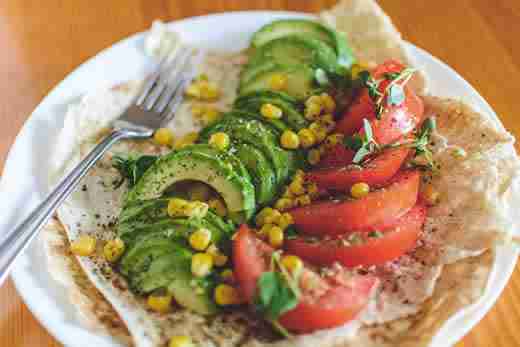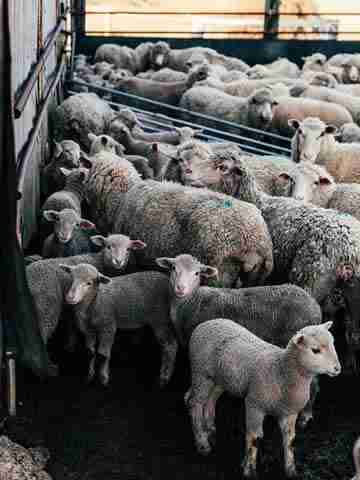Vegetarian Diet to Detox and Cleanse
What are the health benefits of switching to a vegetarian diet to detox and cleanse from the inside out and stop eating meat to be kinder to your body and to the planet we live on?
Have you decided to go meat-free and clean up your diet in many ways?
 I'll take a look at these questions and the answers that are becoming more widely accepted among health experts.
I'll take a look at these questions and the answers that are becoming more widely accepted among health experts.
What is a Vegetarian Diet?
First of all, if you're not quite sure what constitutes a vegetarian diet, here is a fairly simple explanation that most people can follow, absorb and understand.
Being a vegetarian in its most simplistic terms means you omit all meat from your diet.
From that basis, there are varying levels of vegetarianism that different people adopt as their preferred eating regime. This can range from allowing certain animal-based foods such as eggs and dairy to a completely strict, "no animal product at all" variation known as veganism.
For the purposes of this article, I will focus on the slightly more relaxed food regime and not on the strict vegan version of the diet (this is to be covered in a separate article).
So, in short, all plant-based foods are allowed along with eggs, cheese and other dairy, fungi (mushrooms etc), nuts, seeds and grains.
Is Seafood Allowed?
Allowing some forms of seafood into a diet changes the definition of what you are actually extending your food choices to, away from true vegetarianism.
Fish and shellfish are living creatures and as such cannot be realistically accepted as part of a vegetarian diet. However, allowing seafood but not meat from land animals has its own definition.
There is an accepted term for this, which is a "pescetarian diet" that follows all the accepted foods for vegetarians as well as fish and shellfish.
Why Should I Not Eat Meat?
There are a number of reasons people choose to stop eating the meat of land animals and opt for a mostly plant-based diet.
Arguably the most important of these is ethical, wherein a person becomes vegetarian because they feel it is cruel and unjust to eat the flesh of a living creature that must be killed to be eaten.
No Happy Animals
Another important reason is that it is rapidly becoming more difficult to find any meat from animals that have at least lived a relatively normal life in nature before being slaughtered.
 Most meat that finds its way onto the grocery store shelves comes from farms where animals are kept in deplorable conditions.
Most meat that finds its way onto the grocery store shelves comes from farms where animals are kept in deplorable conditions.
This situation is considered offensive and downright repulsive to many people. Livestock are not allowed to roam free in green fields to eat grass and wild plants, enjoy the fresh air and sunshine and have at least something of a happy life before it is ended.
On the contrary, livestock are kept locked up in huge buildings, caged in very close quarters with each other in their thousands. They almost never see the light of day, let alone get to enjoy a tasty blade of grass to eat!
What Are Livestock Eating?
Oh no. They are fed a grain-based "feed" that also contains animal-derived protein that is most unnatural for their digestive systems. That animal-derived protein is actually the ground-up carcases of other dead farm animals.
This is abhorrent, as most livestock are by nature vegetarian with digestive systems designed to digest plants, grasses mostly. Instead they are being fed the remains of other animals mixed with grains, which is absolutely disgusting human behavior.
Animal Medication
The farm animals are routinely injected with growth hormones to make them grow to maturity faster than nature intended and because of the squalid conditions they live in, they are also injected with a cocktail of antibiotics and other medications to stop them getting sick or infected.
Do you still want to eat that meat there in that nice looking packaging on the supermarket shelf?
How is a Plant-Based Diet Healthy?
By avoiding meat in a healthy diet, a person can still get just about all the nutrition they need from plants, nuts and seeds (vegans do perfectly well from this).
However, there are some deficiencies that occur such as certain of the B vitamins (primarily B12) which can be made up by supplementation or including some animal products such as eggs and dairy. The B vitamins can be obtained from nutritional yeast as an alternative to supplementation.
Eating the bulk of meals consisting of plants is actually very healthy as almost all nutrition comes from eating a wide variety of vegetables and fruits along with nuts and seeds. When you consider the question of what you might be missing from omitting meat, just remember where the animals got those nutrients from in the first place.
Yep, they get them from eating plants!
Medication-Free
Another major health benefit of a meat-free diet is missing out on all the residual medications and antibiotics that would still be present in the meat of slaughtered farm animals.
This is actually a huge health benefit, because most, if not all of those animal medications would in some way have an adverse affect on our own bodies.
Antibiotics are among the worst offenders as there are still some residual antibiotics present in meat. These will find their way into your gut and interfere with the natural balance of your gut microbiome, allowing the overgrowth of unfriendly bacteria leading to all kinds of health problems.
What About Pesticides?
One of the biggest problems facing vegetarians is how to avoid eating crops that have been sprayed with pesticides and other chemicals.
It is no secret that sprayed crops maintain a residual amount of those chemicals when they find their way onto your plate no matter if you wash them thoroughly. This is because the residual substances exist inside the plants on not just on the outer layers or skins.
The best way to avoid eating chemical-laden vegetables and fruits is to either grow them yourself or buy them from certified organic suppliers. Plus, organic fruits and veggies taste better (at least that is my own opinion)!
Conclusion
If you have had enough of how modern farming practices are producing what can best be described as toxic food for humans to eat, you can choose to change your diet to become meat-free any time you want.
After all, one of the great assets we humans possess is the ability to make choices based on sound reason backed up by facts and evidence. Choosing vegetarianism has many verifiable health benefits as well as going a long way to being good for the environment.
This is because by reducing the volume of meat required for food, farms would be forced to turn over huge expanses of land to grow crops for human consumption instead of the incredibly huge areas that are dedicated to growing grain crops to feed livestock. Just think of the saving in the creation of those unwanted greenhouse gasses!
Plus, as a vegetarian, you will avoid consuming the residual medications present in meat products.
Most importantly, you will not have the slaughter of defenceless animals on your conscience when you eat your next meal.
(TOP)
